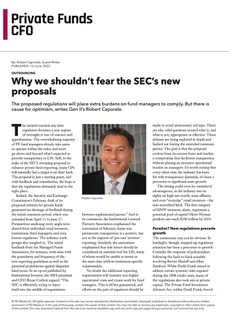Insights
Article
Private Funds CFO: Why we shouldn’t fear the SEC’s new proposals

Authored by: Robert Caporale, President, Strategic & Digital Solutions
Updated on: January 30, 2024
While the new proposed regulations promise an increased burden on fund managers, could there be cause for optimism?
Whenever the SEC proposes sweeping changes to reporting guidelines, private fund managers naturally feel trepidation and concern. In reality, the majority of PE fund managers provide ultra-transparent reporting to their Limited Partners (LPs) and may see the new proposals as unnecessarily punitive.
The initial proposed reforms - presented in February 2022 - generated massive feedback during the requisite comment period. From industry trade groups to fund managers to retail investors, comments included concerns over the frequency and granularity of reporting guidelines and potential prohibitions that would limit investor participation.
As published in an op-ed in Institutional Investor, Managed Funds Association President and CEO, Bryan Corbett, argued that “The SEC is effectively trying to inject itself into the middle of negotiations between sophisticated parties.”
On an operational note, many comments expressed concern about the higher operating costs and added work the new reporting requirements would create for fund managers.
According to Robert Caporale, Gen II’s head of Strategic Business Development, “The proposal is just a starting point, and with feedback and consultation, the hope is that the regulations ultimately land in the right place.”
A Precursor to Significant Asset Growth?
With that said — it’s important to note that every time transparency demands collide within the investment industry, it has been a major precursor to sizable asset growth.
Consider the aftermath of the 2008 financial debacle which was followed quickly by the Bernie Madoff and Allen Stanford fraud revelations.
In response, Congress enacted Dodd-Frank aiming to strengthen regulations and stem systemic risks that were exposed during the credit crisis. As part of Dodd-Frank, every PE advisor with over $150 million in Assets Under Management (AUM) to was required to register with the SEC and to begin reporting using Form PF.
While Dodd-Frank was not popular, no one can deny the sustained trajectory of asset growth that took place over the next 10+ years.
There’s an Ecosystem to be Leveraged
There is an ecosystem available to provide support as things move forward. PE managers will be able to absorb new responsibilities through the support of these various ecosystem participants.
There are fund administration firms that specialize in back office challenges inherent in the new regulations and can streamline performance reporting and disclosures. Lawyers will be well versed in providing guidance on legal obligations, conflict of interest issues, and reporting nuances. And accounting firms will be able to provide specialized audit support and solutions.
Moving Forward
Once passed, there will be a period of frenzied activity while PE Funds and ecosystem participants prepare and position for the future. Once the regulations have been fully absorbed, business will continue in its new iteration.
Private capital is far too compelling as an alternative for funding growth and capturing alpha. Its why retail investors are desperate to participate.
Rather than fearing the new regulations being proposed by the SEC and CFTA, embracing them through the support of fund administration experts would be a solid precursor to the next big move.
Published on: July 18, 2022
Explore Insights

Gen II Fund Services, LLC
1675 Broadway, 4th Floor
New York, NY 10019
212-408-0550
info@gen2fund.com
General Inquiries:
888-GEN2-001
Press Inquiries:
North America: tfaust@stantonprm.com
Europe: dan.jason@wearematerialimpact.com
Report Personal Data Breach >




